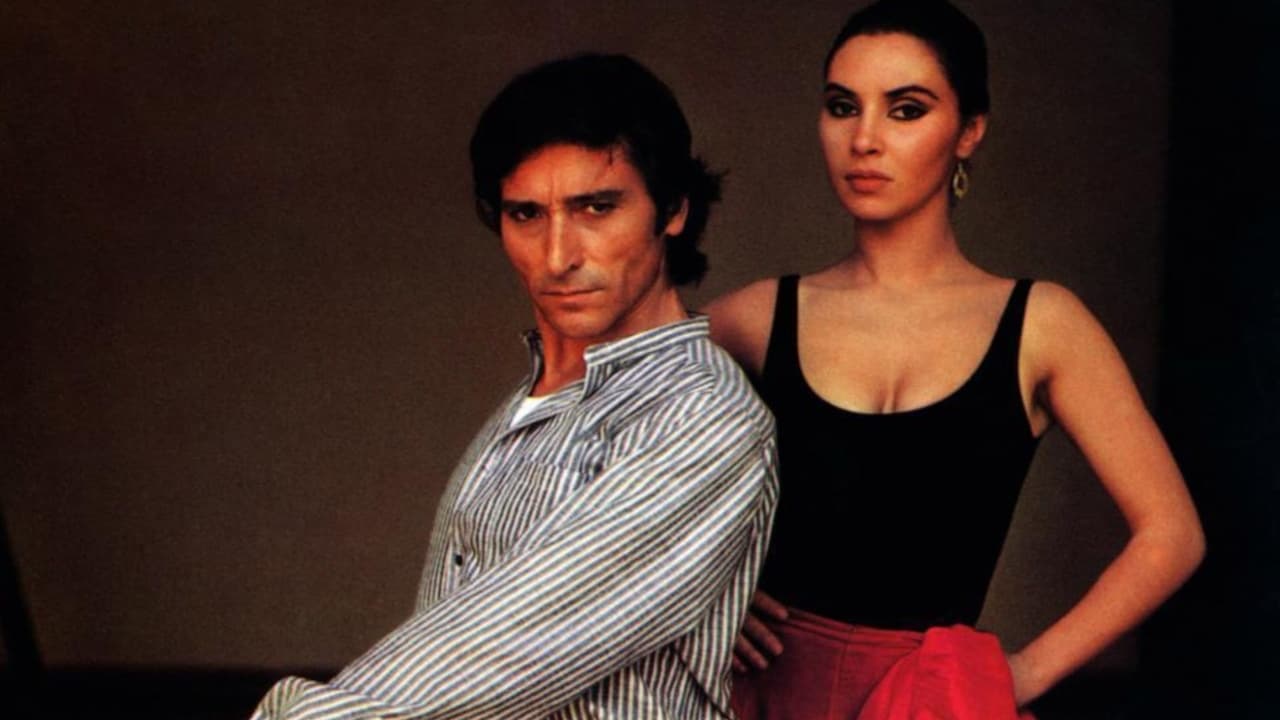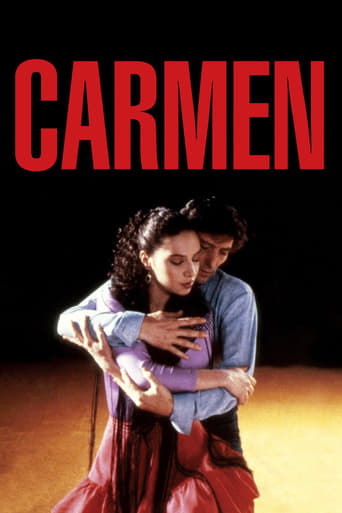



There is just so much movie here. For some it may be too much. But in the same secretly sarcastic way most telemarketers say the phrase, the title of this one is particularly apt.
View MoreI wanted to like it more than I actually did... But much of the humor totally escaped me and I walked out only mildly impressed.
View MoreIt’s fine. It's literally the definition of a fine movie. You’ve seen it before, you know every beat and outcome before the characters even do. Only question is how much escapism you’re looking for.
View MoreStory: It's very simple but honestly that is fine.
The amazing grace and power of flamenco has never been on more vigorous display than in Carlos Saura Carmen, the second of the Spanish director's flamenco trilogy that includes: Blood Wedding (1981), Carmen (1983), and El Amor Brujo (1986). Although the epitaph for movie musicals has now been written, there was never one more alive than this soaring dance interpretation of Bizet's opera based on the novella by Prosper Merimee. Winner of the BAFTA award for Best Foreign-language film and nominated for an Oscar in the same category, in Carmen, Saura attempts to expand the limited vision of the French opera into a deeper and more artistic example of Spain's national identity. Supported by performances by Spain's great guitarist Paco de Lucia and familiar songs by Bizet such as Toreador's March, La Habanera, and the lovely Intermezzo, the film bursts with energy and sensuality.Shot in Gades' dance studio in Madrid, the film is marked by riveting performances by Antonio Gades, former director of the National Ballet of Spain, Cristina Hoyos, an acclaimed flamenco dancer, and singer and dancer Laura del Sol in her first leading role. Carmen opens with the director of the dance company (Gades) rehearsing for a dance production of the opera. He is searching among his students for a young dancer to play the lead role but has not found one that suits his ideal. According to Gades, he wants a girl with "a wild and strange beauty, her lips full and well shaped, opening onto small teeth, whiter than the whitest pearls, her long, black, shiny hair with blue glints similar to a raven's feathers, and eyes with a voluptuous but surly expression." It is only when the director/choreographer travels to a similar studio in Seville that he finds his Carmen, played by the dark-haired del Sol. The film then moves seamlessly between the rehearsals of the company for its new production and the lives of the dancers, reflecting the story of the opera in an almost surreal way that blurs the distinction between illusion and reality. The teacher becomes personally involved with his student but finds that she is elusive, self-absorbed, and proud of her independence. When he discovers, however, that she is married and her husband has just been released from prison after serving a sentence on a drug-related charge, his possessiveness turns into a destructive jealousy that ends the film on a melodramatic tone.Some of the most memorable scenes in Carmen include Gades dancing the Ferucca in his own home as his lover sees him through his window, then, once inside, watches while he performs a full routine. Another remarkable sequence is the dance between Gades and Christina that depicts the male-female relationship with elegance and grace. Though the performance by del Sol captures Carmen's fiercely independent streak, for me she seems a bit too wholesome to be fully convincing as a jezebel, leaving the tragic resolution of the story feeling unmotivated. Whether or not you find the drama convincing, however, ultimately the film is not about the story but about the passion and breathtaking art of the dance. Carmen is a powerful experience that can evoke in the viewer an unexpected feeling of wonder
View MoreThis is a wonderful film! Full of passion, music and drama. It follows the story of the opera of the same name. Even Carmen-haters will agree that this is a version that overcomes the boredom bred of familiarity and infuses new life into this overproduced work.The setting is a flamenco school in Spain, and the search is on for the star of a production of a flamenco Carmen. The director finds, and then falls in love with his new leading lady. The complications arise from there, from some unhappiness on the part of the best dancer in the troupe who feels she should be the star and not the newcomer, and from the storyline of the opera.The director of the film is the real-life director of one of the most famous dance schools in Spain, and the dancers, except for the character of Carmen, are members of the school.The dancing is exciting and dangerous, the story, though very familiar, attains fresh vigor in the new setting, and is altogether one of the best films of the eighties.
View MoreOn the face of it, Carlos Saura's 1983 Carmen is simply yet another version - to join dozens of others - of Bizet's world-famous opera, using flamenco music and dance, and a modern story-line, alongside elements of the opera. Following in the footsteps of many a Hollywood musical, Saura sets his story in the period of rehearsal before a new production, except in this case there is no successful opening night as the climax of the movie, but a tragic death echoing the opera. The music and dancing are dramatic, passionate and exciting, especially for those of us who love flamenco; and the weaving together of the modern characters and plot with those of the opera is effective, if somewhat contrived. There is, however, an ironic aspect to the film. Possibly no country in the western world has a stronger culture than Spain. Spanish food, drink, language, literature, music, dance and much else are unique and immediately identifiable. Yet one of its national icons - the free-spirited gypsy Carmen, who seduces and abandons men at will - is a totally French creation. Bizet, who never set foot in Spain, based his 1875 opera on a story by Prosper Merimée, also a Frenchman; and no matter how Spanish his music sounds, it is merely imitation. So for Saura to base a film on Carmen has a significance not shared by the other two films in his "flamenco trilogy" - Blood Wedding and Love the Magician - where the originals are quintessentially Spanish.It is tempting therefore to regard the film as a kind of reclamation for Spain of Bizet's pseudo-Spanish Carmen. And certainly in the adaptation for guitar of some of Bizet's music, and in the translation to flamenco dance of some of the action of the opera, such a reclamation or reconciliation has taken place. But I for one wish that Saura had gone further; had deconstructed the original stereotypes; and had shown that by the late 20th century José had grown up, and could refrain from knifing Carmen, no matter how Spanish he might feel and how free-spirited she might be. In other words, perhaps a happy Hollywood ending would not have been such a bad idea!
View MoreCarlos Saura's Carmen is one of the finest achievements in world, let alone Spanish, cinema. It manages to excite interest in flamenco in its wonderful staged adaptations from Bizet with powerful physical force. At the same time we see the impact of the creation and rehearsal of a new interpretation of Carmen on the choreographer/director and the principle dancers. The fine line between life and art is dazzling.
View More